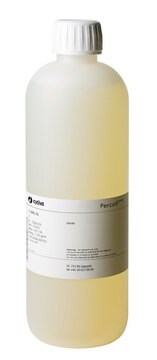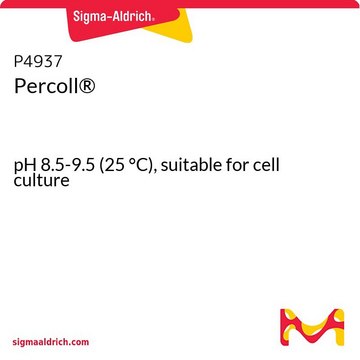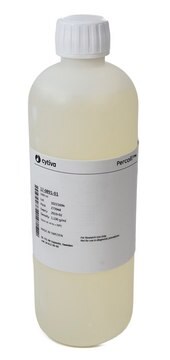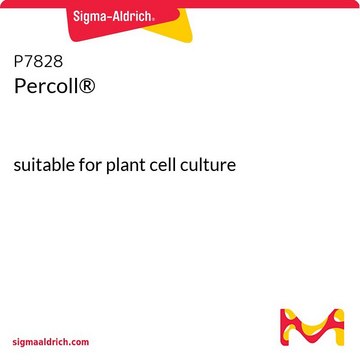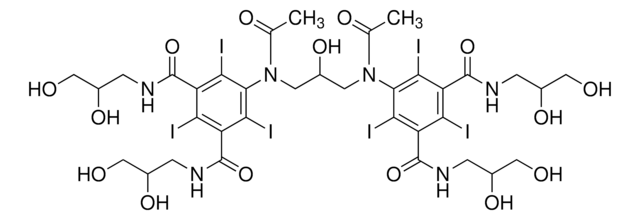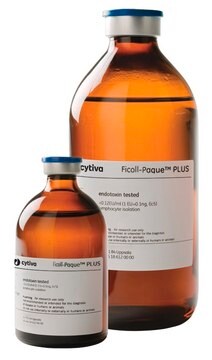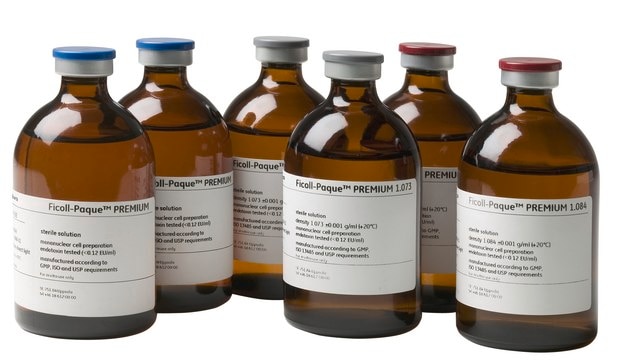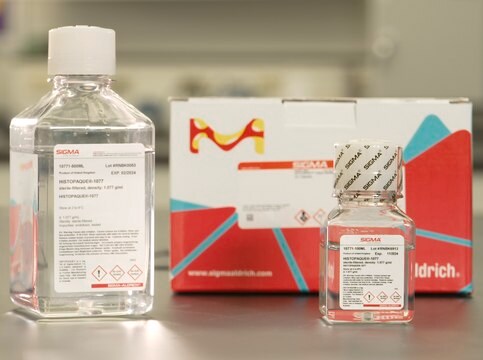推薦產品
形狀
colloidal (Colloidal solution of silica coated with polyvinylpyrrolidone (PVP))
liquid (Suspension)
solution
包裝
pack of 250 mL
製造商/商標名
Cytiva 17-0891-02
顏色
Colorless to slightly yellow
pH值範圍
8.5-9.5
一般說明
Percoll® is a well-referenced media for density gradient centrifugation of cells, viruses, and subcellular particles. Percoll® is composed of colloidal silica coated with polyvinylpyrrolidone (PVP).
Percoll® is a low viscosity density gradient medium for preparation of cells, subcellular particles, and larger viruses. The low viscosity of the medium enables cell preparation on preformed gradients in only a few minutes using low centrifugal forces (200 to 1000 × g). The medium is available in easy-to-open, resealable 250 mL and 1 l bottles.
Percoll® consists of silica particles (15 to 30 nm diameter) coated with non-dialyzable polyvinylpyrrolidone (PVP). Free PVP is present at only 1% to 2%. Percoll® is non-toxic, almost chemically inert and does not adhere to membranes. Percoll® gradients can be formed within the density range of 1.0 to 1.3 g/mL, and are iso-osmotic throughout.
Percoll® can be stored unopened at room temperature for five years. At -20° C, it can only be stored for up to six months. If stored at -20° C, gradients form upon thawing, necessitating a mixing of the bottle before use. Preformed gradients can be stored for weeks without a change in gradient shape, provided that the gradient remains unfrozen. Percoll® can be buffered within the pH range 5.5 to 10.0 without any changes in properties. If the pH is dropped below 5.5, gelling may occur. Gelling can also be caused by the presence of divalent cations, an effect which is exacerbated by elevated temperatures.
Percoll® is a low viscosity density gradient medium for preparation of cells, subcellular particles, and larger viruses. The low viscosity of the medium enables cell preparation on preformed gradients in only a few minutes using low centrifugal forces (200 to 1000 × g). The medium is available in easy-to-open, resealable 250 mL and 1 l bottles.
Percoll® consists of silica particles (15 to 30 nm diameter) coated with non-dialyzable polyvinylpyrrolidone (PVP). Free PVP is present at only 1% to 2%. Percoll® is non-toxic, almost chemically inert and does not adhere to membranes. Percoll® gradients can be formed within the density range of 1.0 to 1.3 g/mL, and are iso-osmotic throughout.
Percoll® can be stored unopened at room temperature for five years. At -20° C, it can only be stored for up to six months. If stored at -20° C, gradients form upon thawing, necessitating a mixing of the bottle before use. Preformed gradients can be stored for weeks without a change in gradient shape, provided that the gradient remains unfrozen. Percoll® can be buffered within the pH range 5.5 to 10.0 without any changes in properties. If the pH is dropped below 5.5, gelling may occur. Gelling can also be caused by the presence of divalent cations, an effect which is exacerbated by elevated temperatures.
應用
Used in balanced salt solutions, physiological saline or 0.25 M sucrose.
特點和優勢
- For separation of cells, subcellular particles and larger viruses (down to ~ 70S) under gentle conditions which preserve viability and morphological integrity.
- Non-toxic to cells.
- Adjustable to physiological ionic strength and pH.
- Gradients can either be preformed or spontaneously generated by centrifugation at moderate speeds in an angle-head rotor.
- Gradients are iso-osmotic throughout and cover a range of densities up to 1.3 g/mL.
儲存和穩定性
Please be aware this product may be shipped 90 days before the expiration date. For more information on the batch specific expiration date, please contact technical service.
Store at 4 to 30 °C ()
分析報告
To view the Certificate of Analysis for this product, please visit www.cytiva.com.
法律資訊
Percoll is a registered trademark of Cytiva
儲存類別代碼
12 - Non Combustible Liquids
水污染物質分類(WGK)
WGK 3
閃點(°F)
Not applicable
閃點(°C)
Not applicable
分析證明 (COA)
輸入產品批次/批號來搜索 分析證明 (COA)。在產品’s標籤上找到批次和批號,寫有 ‘Lot’或‘Batch’.。
客戶也查看了
我們的科學家團隊在所有研究領域都有豐富的經驗,包括生命科學、材料科學、化學合成、色譜、分析等.
聯絡技術服務